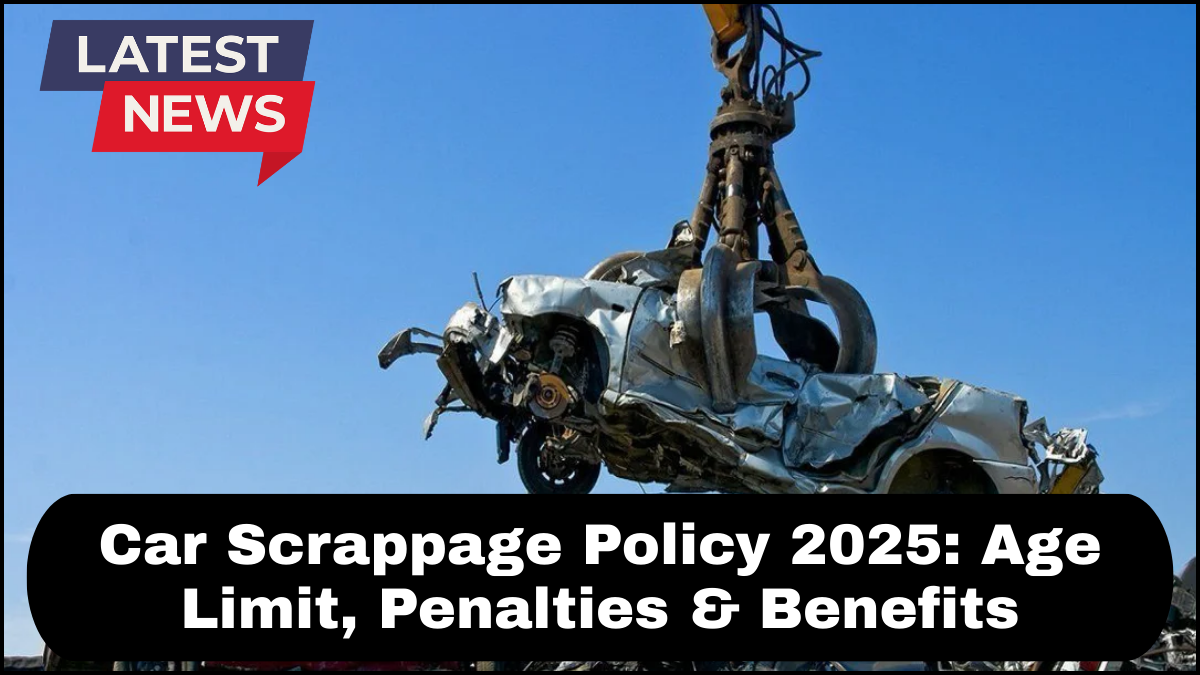The Car Scrappage Policy 2025 is a significant step by the Indian government to modernize the country’s automotive ecosystem. Focused on eliminating polluting and unfit vehicles from Indian roads, the policy not only encourages environmental sustainability but also supports automotive industry growth and road safety.
This guide dives into the essential aspects of the policy—vehicle age rules, associated penalties, key benefits, and what it means for vehicle owners.

What Is the Car Scrappage Policy?
The Car Scrappage Policy is a government initiative introduced to phase out old vehicles that are no longer roadworthy or environmentally compliant. These include both personal and commercial vehicles that fail to meet the fitness criteria after a certain age.
The objective is to reduce vehicular emissions, improve fuel efficiency, and promote the use of cleaner, safer, and more efficient vehicles across the country. Scrapping old, polluting vehicles is also expected to support the circular economy by recovering valuable materials like steel, aluminum, and plastic.
Vehicle Age Rule: When Does a Vehicle Become Unfit?
The policy lays down clear vehicle age rules to determine when a vehicle should be scrapped:
-
Private vehicles: These will be required to undergo a fitness test after completing 15 years. If they fail, they must be deregistered and scrapped.
-
Commercial vehicles: These vehicles must undergo a fitness test after 10 years. Non-compliant vehicles will not be allowed to run on public roads.
Fitness tests will be conducted at authorized automated testing stations, ensuring a transparent and standardized evaluation process. Vehicles that pass may continue to operate, subject to periodic re-testing.
Penalties for Non-Compliance
Owners who continue to use unfit or deregistered vehicles will face strict penalties:
-
Hefty Green Tax: An additional tax for old vehicles to discourage usage.
-
Registration Denial: Renewal of registration for failed vehicles will be prohibited.
-
Fines and Seizure: Continued operation of non-compliant vehicles may lead to monetary fines and impounding of the vehicle.
-
No Insurance Renewal: Insurance companies are unlikely to renew policies for vehicles that fail the fitness test.
These measures are designed to enforce compliance and ensure that old vehicles are systematically phased out.
Benefits of the Car Scrappage Policy
1. Environmental Impact
Phasing out old, polluting vehicles will significantly reduce carbon emissions, particulate matter, and noise pollution. Newer vehicles adhering to BS6 standards are more efficient and cleaner.
2. Boost to the Automotive Industry
The replacement of scrapped vehicles with new models will drive demand for automobiles, especially electric and hybrid vehicles, stimulating growth in manufacturing and ancillary sectors.
3. Better Fuel Efficiency
Old engines tend to consume more fuel. Upgrading to modern vehicles will save fuel costs and reduce dependency on fossil fuels.
4. Enhanced Road Safety
Aging vehicles are more prone to breakdowns and accidents. Removing such vehicles ensures safer roads and fewer fatalities.
5. Economic Recycling
Scrapped vehicles provide raw materials for manufacturing and infrastructure, reducing the need for virgin resources and promoting industrial sustainability.
6. Incentives for Owners
To make the transition easier, vehicle owners may receive:
-
Scrappage certificates
-
Road tax rebates
-
Discounts on new vehicle purchases
-
Waiver of registration fees for new vehicles
These benefits create a financially viable pathway for replacing old vehicles.
Implementation Timeline and Infrastructure
The policy will roll out in phases, starting with commercial and government vehicles. By April 2025, fitness testing will be mandatory for all eligible vehicle categories.
To support the initiative, the government is setting up a network of:
-
Automated fitness testing centers
-
Registered Vehicle Scrapping Facilities (RVSFs)
These will be operational across states to ensure hassle-free testing and scrapping processes.
Frequently Asked Questions (FAQs)
Q1. What happens if my vehicle fails the fitness test?
If your vehicle fails, you will not be allowed to renew registration. You must either scrap it or invest in repairs and re-testing. If it fails again, scrapping becomes mandatory.
Q2. Is the car scrappage policy mandatory?
Yes, once a vehicle crosses the age threshold and fails the fitness test, it must be scrapped as per policy guidelines.
Q3. What are the incentives for scrapping old vehicles?
Owners may receive a scrappage certificate, tax rebates, discounts on new vehicle purchases, and exemptions on registration fees.
Q4. Can a vintage car be scrapped under this policy?
No. The policy excludes vintage and classic cars that are registered under special provisions and maintained in accordance with the law.
Q5. How do I find an authorized scrapping center?
You can locate Registered Vehicle Scrapping Facilities (RVSFs) through your state transport department’s website or through central government portals once fully operational.
click here to learn more